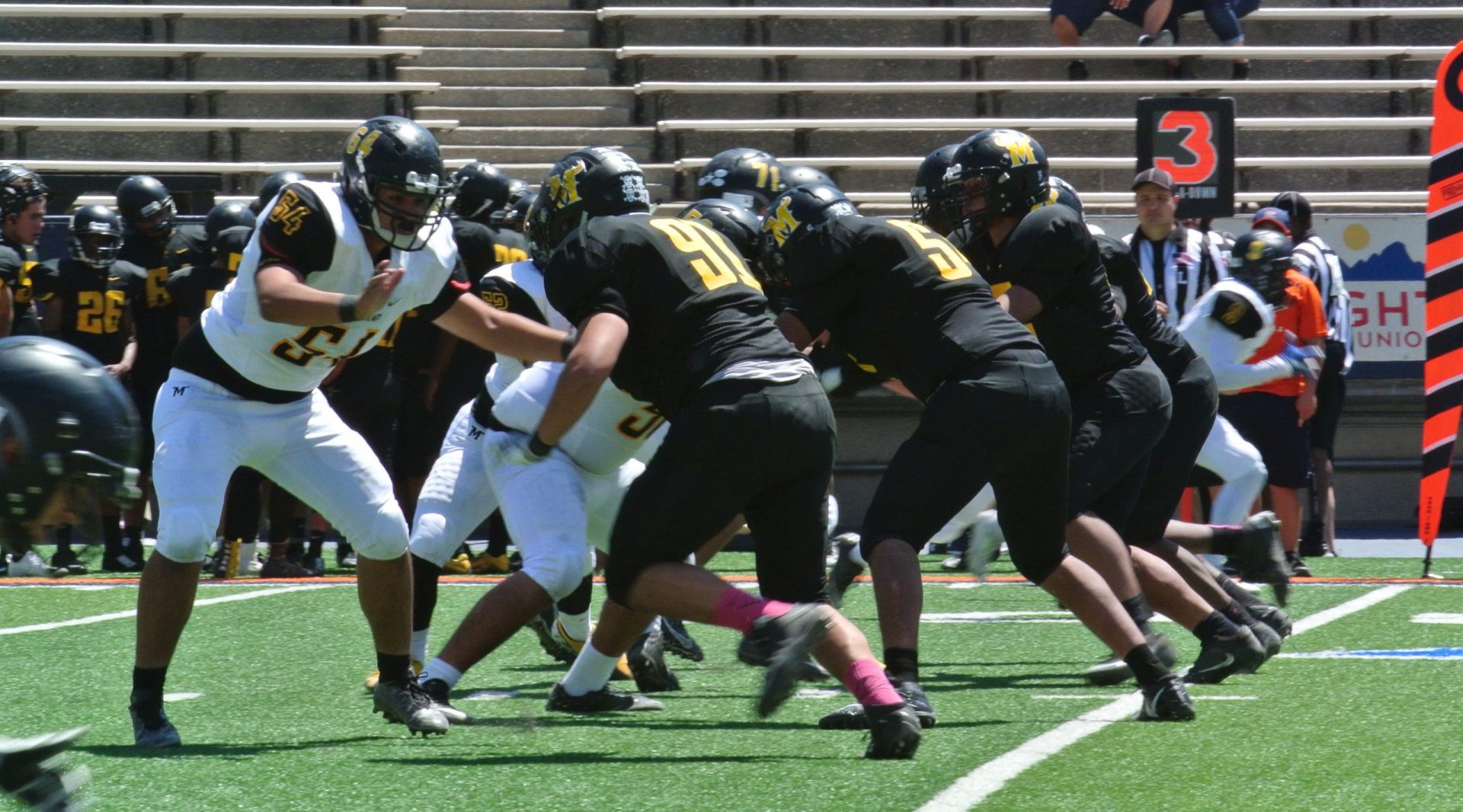
To the common observer one might not think that there is much difference between an offensive lineman lining up in a 2-point stance (no hand on the ground) versus a 3-point stance (1 hand on the ground). Each has their own positives and negatives to successfully playing the position of offensive line. Whether or not an offensive lineman goes out of a 2-point or a 3-point is purely determined by the coaches and the offenses they run. Let’s take a look at some of the more important aspects of each.
2-Point Stance Advantages
-Affords better vision for an offensive lineman as his head is upright and able to see how the defense is lining up and/or moving around. It’s harder for an offensive lineman to see what’s in front of him when he’s in a 3-point stance as the head naturally wants to look down.
-An offensive lineman can move his alignment out wider or tighten down because his hand isn’t on the ground. This is beneficial for offenses that check or change their plays once everyone is set. Also allows for realignment if the defense changes their front.
-Makes it easier for those linemen that might not be as flexible (particularly in the hips) to get down into a stance.
-Allows for an offensive lineman to theoretically get his hands out and on a defender quicker as they are on his thighs pre-snap as opposed to having one hand on the ground.
-Those offenses that are primarily pass oriented typically have their offensive linemen go out of a 2-point stance as it makes it easier for them to begin their pass protection as soon as the ball is snapped by ensuring their head is back and hands are ready to punch defender.
-Many linemen say that they are better able to hear the Quarterback’s cadence when they are in a 2-point stance because their head is up.
-Easier for linemen to communicate with each other.
-Makes it easier to reach a wider aligned defender
3-Point Stance Advantages
-Before the ball is snapped, a 3-point stance gets the offensive lineman’s pad level down to or slightly lower than the defensive player across from him.
-Teams that like to run the ball will have their linemen go out of a 3-point stance as it gets them better prepared to “explode” off the ball once its snapped.
-Less chance an offensive lineman “false steps” once the ball is snapped as weight displacement is almost always going to be the same out of a 3-point stance. Easier to deviate weight displacement out of a 2-point (easier to change foot placement).
-Affords better pre-snap loading of hip, knee and ankle angles to be able to explode and move a defender more easily than a 2-point stance.
*****
As you can see from the advantages of each that there are good reasons for the use of both the 2-point and the 3-point. One would think that you should just go out of the 3-point when you want to run the ball and use the 2-point when you are going to throw it. The problem with that is that you would be giving away some serious pre-snap tendencies to the defense. An exception for the 3-point stance coaches would be when it’s clearly a situation where everyone knows that the offense must throw the ball, so giving away a pass tendency by having linemen get in a 2-point stance doesn’t really matter.
Some coaches reach a compromise of sorts by letting their Tackles go out of a 2-point stance and have their Guards use the 3-point stance. This philosophy is also a good one for the 2-point stance coaches when facing a defense that runs an even front (4-down linemen with defensive tackles over the offensive guards). When those 2 interior defensive linemen are very good players, getting the offensive guards pad level lower by going out of a 3-point will help to improve the odds that they can get movement on those guys. Conversely, for those 3-point stance coaches that are facing a defense that utilizes a wide defensive end that is also very fast, putting an offensive tackle in a 2-point will increase his odds that he may be able to block him.
Personally, I have always preferred to use the 2-point stance as it frees up the offensive linemen to move before the ball is snapped if necessary as checking plays is something we do.
But, if at any point the offensive linemen I am working with that year are not getting their “pad level” and/or not getting movement on the defense when we are running the ball, we will go out of a 3-point stance. The bottom line is that doing what the linemen you have are best at gives an offense the best chance to win the game.
Brought to you by:



















